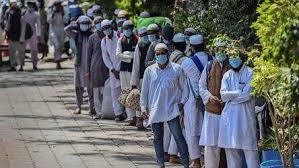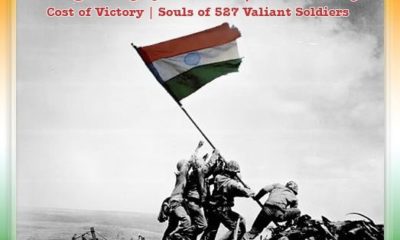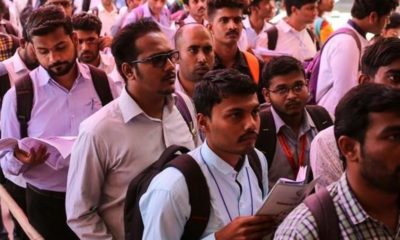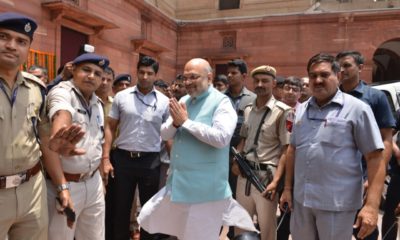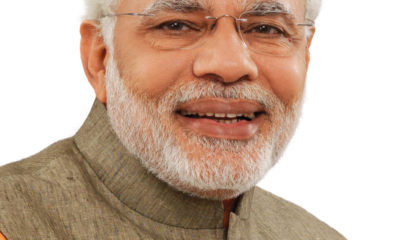Feature
Former Punjab’s DGP K.P.S. Gill passes away due to cardiac arrhythmia

New Delhi: The former Punjab’s DGP of Punjab popularly know as supercop in the department K.P.S. Gill, died yesterday due to sudden cardiac arrest.
Gill was popularly know as ‘Supercop’ in Punjab, as he had played a major role in wiping out militancy from Punjab in the ’90s and had advised Gujarat and Chhattisgarh governments on security, died here on Friday after suffering complications arising out of kidney failure and heart disease.
Kanwar Singh Pal Gill, 82, died at 2:55 p.m. at the Sir Gangaram Hospital where he was admitted on May 18. Gill was suffering from the end-stage kidney failure and significant ischemic heart disease. He had been recovering from peritonitis but died of sudden cardiac arrest due to cardiac arrhythmia.
Known for his no-nonsense attitude, Gill was a controversial figure and several groups had leveled allegations of human rights violations against him while he battled insurgency.
There was also a case of sexual harassment filed by Indian Administrative Service officer Rupan Deol Bajaj, a case in which he was convicted and sentenced to three months’ imprisonment in 1996. But after an appeal in the Supreme Court, the jail sentence was reduced to probation.
When Punjab faced a serious problem of insurgency by Khalistan extremists in the 1980s, Gill was Director General of Police from 1988 to 1990 and then again from 1991 to 1995 till his retirement.
Before Gill, the state had contracted the services of another top cop, Julius Ribeiro from Maharashtra, who had contributed his might in eliminating terror. In a controversial decision, Gill expanded a bounty system of rewards for police who killed militants-a practice his detractors alleged encouraged the police to resort to extra-judicial killings.
Gill was largely credited with having dealt with militancy in Punjab with an iron hand and with breaking the back of the Khalistani movement. During the militancy and even a little later, scores of political leaders and police officials lost their lives in the terror that held sway in the state in the ’80s and the ’90s.
Notable among them was Akali Dal leader Harcharan Singh Longowal, who signed the Punjab Accord with the Prime Minister Rajiv Gandhi, and the then Chief Minister Beant Singh.
Gill was not deterred by the anti-Centre discourse that took place after ‘Operation Blue Star’ in 1984, and he dared to command “Operation Black Thunder” in 1988 to again flush out militants hiding in the Harmandar Saheb, the Golden Temple in Amritsar.
The operation offended the Sigh high priests and they held the then Chief Minister Surjit Singh Barnala “guilty” of being ‘anti-sect’ for ordering the anti-militant campaign. Later, Barnala made amends by offering apologies and doing ‘kar sewa’ at the Golden Temple.
In 2000, the government of Sri Lanka sought Gill’s expertise as an anti-militancy expert to draw a counter-terrorism strategy against the dreaded LTTE, the Lankan Tigers of Tamil Eelam. Two years later, after the post-Godhra violence in Gujarat, Narendra Modi as the Chief Minister appointed him a security advisor in the state.
Gill was also considered an expert on the north-east region where he had worked in his initial years in the Indian Police Service (IPS), essentially in Assam. The Chhattisgarh government also later appointed him a security advisor to help check Maoists’ menace between 2005 and 2009.
Entertainment
Meghalaya Reserves Legalized Gambling and Sports Betting for Tourists

The State Scores Extra High on Gaming-Friendly Industry Index
Meghalaya scored 92.85 out of 100 possible points in a Gaming Industry Index and proved to be India’s most gaming-friendly state following its recent profound legislation changes over the field allowing land-based and online gaming, including games of chance, under a licensing regime.
The index by the UK India Business Council (UKIBC) uses a scale of 0 to 100 to measure the level of legalisation on gambling and betting achieved by a state based on the scores over a set of seven different games – lottery, horse racing, betting on sports, poker, rummy, casino and fantasy sports
Starting from February last year, Meghalaya became the third state in India’s northeast to legalise gambling and betting after Sikkim and Nagaland. After consultations with the UKIBC, the state proceeded with the adoption of the Meghalaya Regulation of Gaming Act, 2021 and the nullification of the Meghalaya Prevention of Gambling Act, 1970. Subsequently in December, the Meghalaya Regulation of Gaming Rules, 2021 were notified and came into force.
All for the Tourists
The move to legalise and license various forms of offline and online betting and gambling in Meghalaya is aimed at boosting tourism and creating jobs, and altogether raising taxation revenues for the northeastern state. At the same time, the opportunities to bet and gamble legally will be reserved only for tourists and visitors.
“We came out with a Gaming Act and subsequently framed the Regulation of Gaming Rules, 2021. The government will accordingly issue licenses to operate games of skill and chance, both online and offline,” said James P. K. Sangma, Meghalaya State Law and Taxation Minister speaking in the capital city of Shillong. “But the legalized gambling and gaming will only be for tourists and not residents of Meghalaya,” he continued.
To be allowed to play, tourists and people visiting the state for work or business purposes will have to prove their non-resident status by presenting appropriate documents, in a process similar to a bank KYC (Know Your Customer) procedure.
Meghalaya Reaches Out to a Vast Market
With 140 millions of people in India estimated to bet regularly on sports, and a total of 370 million desi bettors around prominent sporting events, as per data from one of the latest reports by Esse N Videri, Meghalaya is set to reach out and take a piece of a vast market.
Estimates on the financial value of India’s sports betting market, combined across all types of offline channels and online sports and cricket predictions and betting platforms, speak about amounts between $130 and $150 billion (roughly between ₹9.7 and ₹11.5 lakh crore).
Andhra Pradesh, Telangana and Delhi are shown to deliver the highest number of bettors and Meghalaya can count on substantial tourists flow from their betting circles. The sports betting communities of Karnataka, Maharashtra, Uttar Pradesh and Haryana are also not to be underestimated.
Among the sports, cricket is most popular, registering 68 percent of the total bet count analyzed by Esse N Videri. Football takes second position with 11 percent of the bets, followed by betting on FIFA at 7 percent and on eCricket at 5 percent. The last position in the Top 5 of popular sports for betting in India is taken by tennis with 3 percent of the bet count.
Local Citizens will Still have Their Teer Betting
Meghalaya residents will still be permitted to participate in teer betting over arrow-shooting results. Teer is a traditional method of gambling, somewhat similar to a lottery draw, and held under the rules of the Meghalaya Regulation of the Game of Arrow Shooting and the Sale of Teer Tickets Act, 2018.
Teer includes bettors wagering on the number of arrows that reach the target which is placed about 50 meters away from a team of 20 archers positioned in a semicircle.
The archers shoot volleys of arrows at the target for ten minutes, and players place their bets choosing a number between 0 and 99 trying to guess the last two digits of the number of arrows that successfully pierce the target.
If, for example, the number of hits is 256, anyone who has bet on 56 wins an amount eight times bigger than their wager.










